“The world’s only Free-Air Carbon Dioxide Enrichment experiment in a mature, warm temperate forest ecosystem”
EucFACE – Eucalyptus Free Air Carbon Dioxide Enrichment Experiment – is designed to predict the effects of rapidly rising atmospheric carbon dioxide on Australia’s unique native forests. No such experiment of this size has ever been done in the Southern Hemisphere.
We acknowledge the Dharug people as the traditional owners of the Cumberland Plain. We pay our respects to Elders past and present
News
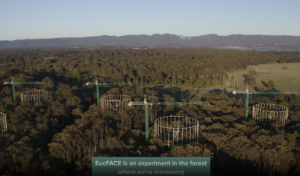
The EucFACE experiment featured in a film
The EucFACE experiment featured in a film promoted to over 4000 attendees at the 26th IUFRO World Congress, held recently in Stockholm, Sweden. The International
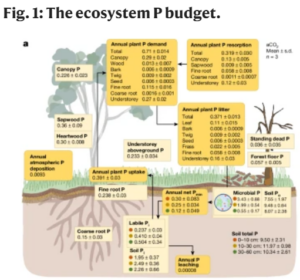
Microbial competition for phosphorus limits the CO2 response of a mature forest
NATURE Published: 05 June 2024 Abstract The capacity for terrestrial ecosystems to sequester additional carbon (C) with rising CO2 concentrations depends on soil nutrient availability1,2. Previous
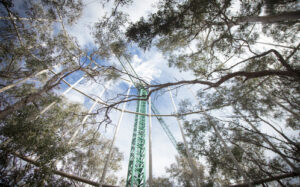
Eucalyptus trees hindered by soil microbes in elevated CO2 environments
Researchers at Western Sydney University have released a groundbreaking study finding that elevated carbon dioxide (CO2) levels, which are expected to boost plant growth, may
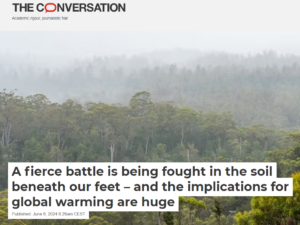
The Conversation: A fierce battle is being fought in the soil beneath our feet – and the implications for global warming are huge
Published: June 6, 2024 6.26am CEST As humanity continues to burn fossil fuels, the delicate balance of life on Earth is changing. That’s true of

Tropical rainforests show phosphorus key to understanding world’s ecosystems
A new international study led by Western Sydney University researchers has quantified phosphorus constraints to photosynthesis in tropical forests, highlighting how accounting for this constraint

Ten years of CO2 fumigation, phosphorus limitation and disturbance dynamics
University of Birmingham 2022 BIFoR Annual Meeting – transforming our understanding of global forests. Belinda Medlyn, EucFACE, Western Sydney University “Ten years of CO2 fumigation,

EucFACE presentation on Twitter
Will Goodwin, Bachelor of Natural Science (Environmental Management). Rising high above the tree tops at our Hawkesbury campus, you’ll be able to see Australia’s largest
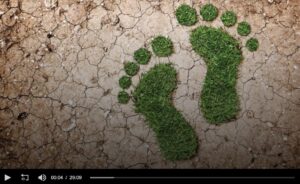
ABC podcast: Saturated trees and carbon rationing
New Australian research suggests trees may not be the carbon sponges we think they are. The findings compliment a larger international study that suggests the

Don’t look to mature forests to soak up carbon dioxide emissions – Nature April 2020
Researchers at Western Sydney University’s EucFACE (Eucalyptus Free Air CO2 Enrichment) (opens in new window) experiment have found new evidence of limitations in the capacity of mature forests to
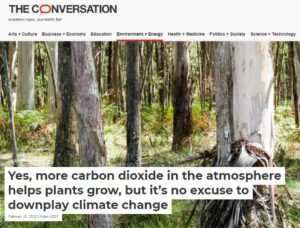
Yes, more carbon dioxide in the atmosphere helps plants grow, but it’s no excuse to downplay climate change – The Conversation Feb 2020
The following opinion piece, co-authored by Professor Benjamin Smith, Director of Research, Hawkesbury Institute for the Environment, was first published with full links on The Conversation (opens
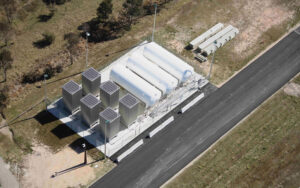
Five Years Of Findings Hint At Australia’s Future Response To Our Changing Atmosphere
“Without EucFACE, prediction models would rely on data gathered from experiments run in the northern hemisphere, which were based on richer soils…” Since its launch
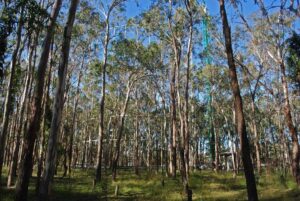
Elevated CO2 does not increase eucalypt forest productivity on a low-phosphorus soil
Nature Climate Change volume 7, pages279–282 (2017). Abstract: Rising atmospheric CO2 stimulates photosynthesis and productivity of forests, offsetting CO2 emissions1,2. Elevated CO2 experiments in temperate planted forests yielded ∼23% increases in productivity3 over

Reception:
Building R2, Room G.67
Western Sydney University
Hawkesbury Campus
Bourke Street, Richmond
2753 NSW Australia
Mail:
Hawkesbury Institute for the Environment
Western Sydney University
Locked Bag 1797
Penrith 2751 NSW Australia
Form to apply to conduct research at EucFACE
Phone Vinod Kumar: +61 2 4570 1125
Phone Hawkesbury Institute for the Environment: +61 2 4570 1335
Email: vinod.kumar@westernsydney.edu.au
For individual telephone numbers please visit People or the HIE Staff pages